CarePrompt - PSW AI Assistant
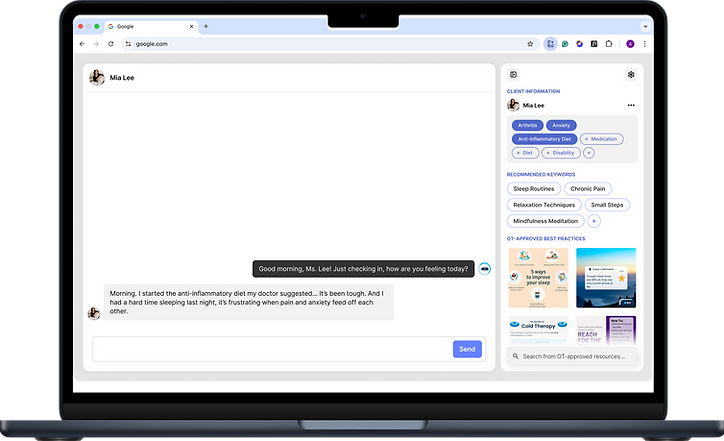
Overview
AI Product, Collaborative, Healthcare, B2B, Saas
Timeline
Jan 2025 - Aug 2025
My Role
Product Designer, Contribute to UX Research and lead AI product prototyping
Background
InvisibleCare is a virtual healthcare support service that provides on-demand, remote, and personalized assistance for clients' daily activities.
The service integrates live support workers (PSWs) with technology to deliver real-time support. InvisibleCare employs 17 PSWs and plans to onboard five new support staff every year.

Initial Challenge
Delayed Support Due to Escalation Protocol
Currently, challenging situations are escalated to an Occupational Therapist (OT) for additional support, which may not provide timely assistance for immediate client needs.
Insufficient use of Best Practices Images
Invisible Care's built-in toolbox of best practice images is underutilized by PSWs, despite their proven effectiveness and efficiency.

UX Research Methods
Interviews
By interviewing 4 PSWs and 2 company's leadership, we uncovered the stakeholder needs and challenges in current working mode.
PSW Shadowing
PSW shadowing enables us to observe the challenges, hesitations and dilemmas in PSW's daily work, leading to valuable questions and deeper insights during interviews.
Role-play Workshop
We designed and ran a 24-person (divided into 6 groups) role-play workshop to mimic the thoughts and barriers when PSW is supporting clients.
UX Research Outcomes - Persona

Background
Emily recently completed her PSW program and joined a virtual care company providing support for clients recovering from brain injuries, mental health conditions, and physical challenges. As a digital native, she’s comfortable with technology but still navigating how to balance empathy and efficiency in remote care.
Profile
Name: Emily Zhang
Age: 24
Location: Mississauga, ON
Role: Personal Support Worker
Experience: 1 Year
Education: Diploma in Personal Support Work
Goals
-
Provide timely, compassionate, and effective virtual support to diverse clients
-
Quickly learn each client's history, preferences, and needs
-
Build rapport and trust with clients in a virtual environment
-
Use digital tools effectively without being overwhelmed
-
Develop confidence in crisis handling and behavior management
Frustrations
-
Searching for appropriate images in the toolbox is time-consuming and not intuitive
-
Information is scattered across multiple platforms, increasing the risk of missing updates
-
Clients often have to repeat themselves due to poor handoff notes or lack of continuity
-
Tone is hard to read in text, making it difficult to respond appropriately
UX Research Outcomes - Stakeholder Goals

Reframed Challenge & KPIs
PSWs have a habitual reliance on OTs for confirmation, even when they possess adequate knowledge and are proceeding correctly, which inadvertently increasing the workload for OTs.
Reduce average response time to 1 minute
Lower escalation rate to below 10%
Enable PSWs to review client info within 30 seconds
Brainstorming and Bundling
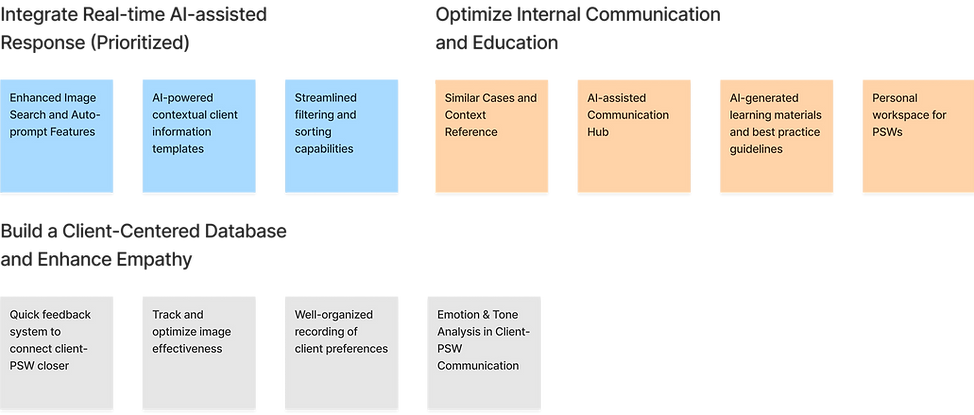
AI Feasibility Research


AI Chatbot Prototype & Documentation
In addition to developing the AI agent to test the feasibility of image retrieval, we also prepared a comprehensive feasibility report analyzing the pros and cons of various AI models, outlining implementation plans, estimating ROI, and addressing potential risks.
Iterative Prototyping
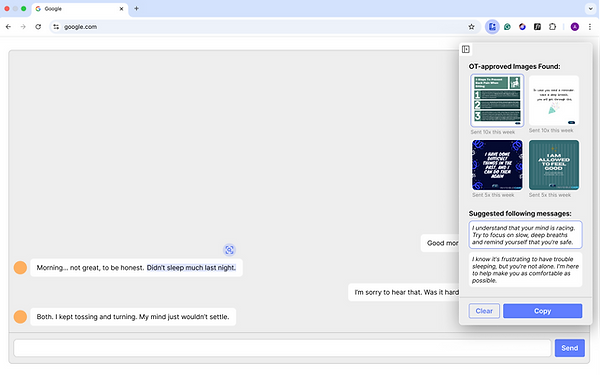
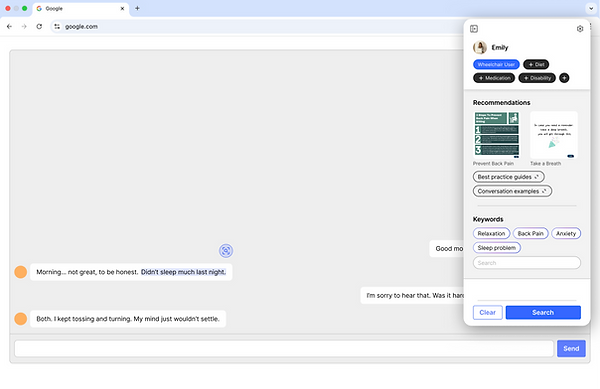

Web extention concept was brought in. Key feature including image retrieval and message recommendation were incorporated.
Client profile and link to resources were added as addtional features. Keyword selection experience was optimized.
Message hover experience was optimized. More fidelity was added to UI.
Usability Testing

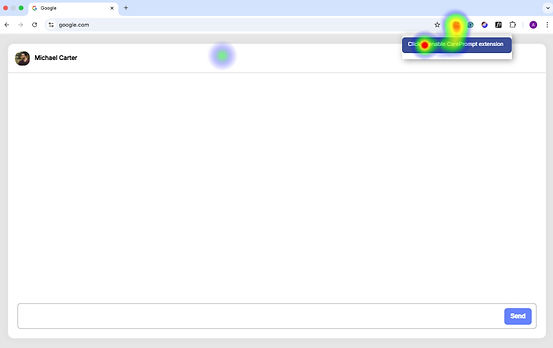
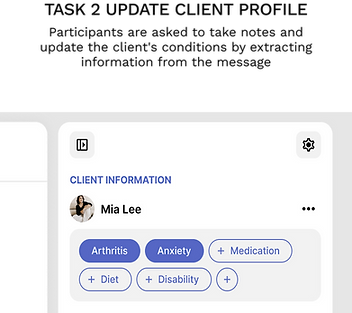
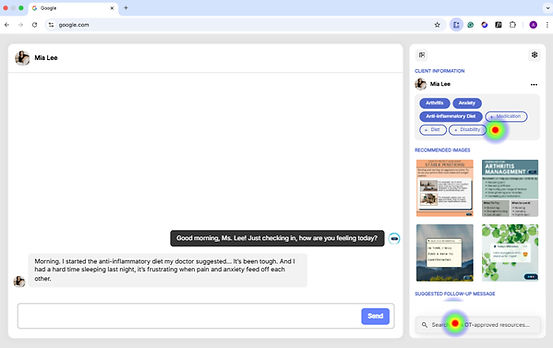


Feedback & Refinements
Alternative Images: Access to the entire image library is needed when not satisfied with retrived images
Search bar to access all images

Hover Dependency: Hovering on message to envoke options is not intuitive especially for new users
Auto-pop action button
Final Design
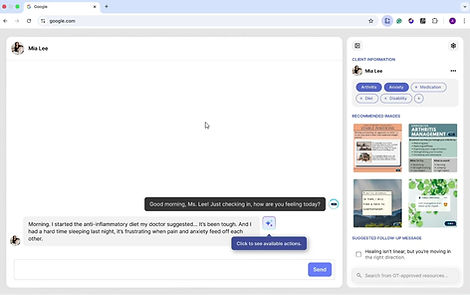
Automated Client Notes
The AI automatically summarizes client messages into concise notes and adds them to the client profile, streamlining documentation and ensuring smooth information transfer between PSWs across shifts.
Image Retrieval and Keyword Filtering
The AI retrieves relevant images based on the client’s message and profile. PSWs can filter these images using labels, select recommended messages, and send both the image and message to the client. If needed, they can also access the full image library for additional options.
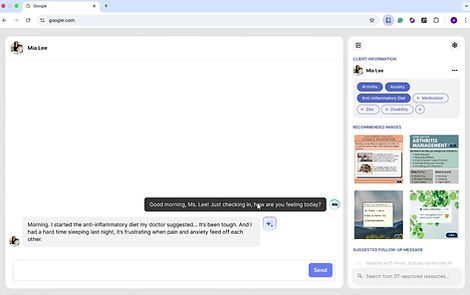
AI Application Prototyping
In this AI product design project, we found that user experience extends beyond user flows and interface design. The performance of the AI model itself is a critical factor in shaping product reliability, user trust, and overall experience. To address this, we built and refined a web application prototype using Python/Flask, the OpenAI API, and prompt engineering techniques, which improved both accuracy and system performance.

Reflection
In this project, I collaborated with diverse stakeholders to design an AI-mediated assistant for Personal Support Workers, integrating image retrieval, recommended messages, and note-taking. The process highlighted the importance of teamwork, role clarity, and evolving confidence as students took greater ownership. Engaging directly with AI as a design material reshaped how I approached user-centred design, requiring me to balance technical feasibility with user trust. Personally, I learned to design with users rather than for them, adapt within complex collaborations, and embrace steady, empathetic iteration, which has shaped me into a more reflective and adaptable designer